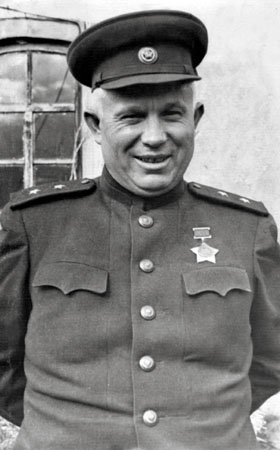 As for some background, Kruschev was born on April 17, 1894, in a relatively rural town. Unlike most of the Soviet leaders, he came from a poor background. He was the son of a coal miner and started working at the age of fifteen as a pipefitter. I suppose he was lucky, but as a result of his occupation, he wasn't drafted into the tsarist army in World War One.
As for some background, Kruschev was born on April 17, 1894, in a relatively rural town. Unlike most of the Soviet leaders, he came from a poor background. He was the son of a coal miner and started working at the age of fifteen as a pipefitter. I suppose he was lucky, but as a result of his occupation, he wasn't drafted into the tsarist army in World War One.
During the war, he joined workers' organizations and the Bolsheviks(Russian Communist Party). He proceeded to join the Red Army in the fight against the Polish and the White army. After emerging victorious Kruschev was given a spot in the new communist school. Unfortunately for him his wife died in famine but married another woman in 1924. Slowly he began ascending towards the top of the communist party. Within five years he was able to join Stalin's Industrial Academy in 1929. Two years later he became the effective governor of Moscow. He remained one of the most loyal comrades during that period and survived the Great Purge of 1930. For the next twenty to twenty-three years Kruschev rose further and further to the top.
 When Stalin died in 1953 Kruschev seized the opportunity. However, he did have a power struggle with another prominent communist leader, Georgy Malenkov. Yet, as a result of the connections he had built, he won the popular vote with ease.
When Stalin died in 1953 Kruschev seized the opportunity. However, he did have a power struggle with another prominent communist leader, Georgy Malenkov. Yet, as a result of the connections he had built, he won the popular vote with ease.
But within a few years, Kruschev criticized Stalinist policies and Stalin himself. Additionally, he wasn't as repressive as Stalin was because he released many prisoners from the gulags. Not only that but he almost caused the total annihilation of the entire world in 1962. The Soviets were looking weak to other countries. But the final straw was his disastrous agricultural plan that was meant to match the production of the United States. Two years later Kruschev was forcibly removed from power.
In the end, Kruschev differed from traditional communist leaders in the sense that he wasn't as repressive and that led to his downfall which allowed Brezhnev to step in.
I enjoyed this post as it gave me a better understanding of the life of Khrushchev and how he rose to power. Something that caught my eye in your post was your mention of The Purge of 1930. Upon doing some research, I found that The Purge of 1930 was lead by Stalin to repress all people who were against the communist regime. An approximately 750,000 people died and millions more were placed in the Gulag. The motives behind why The Purge of 1930 existed are still debated today. Some historians believe it was in effort to crush the people who supported Lenin and the Bolsheviks while others believe it was an effort to unite the Soviet Union. Whatever the case, The Purge of 1930 had a profound impact on the Soviet Union for years to come.
ReplyDeletehttps://www.history.com/topics/russia/great-purge